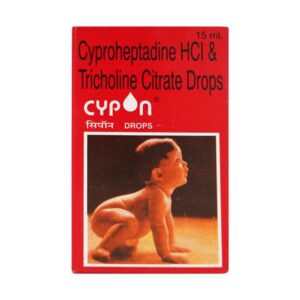CYPROHEPTADINE + TRICHOLINE CITRATE
Cyproheptadine: Cyproheptadine is an antihistamine medication that is commonly used for several purposes. It is primarily used to treat allergic reactions such as hay fever, allergic rhinitis, and hives. It can also be used to manage symptoms of allergic reactions to blood or plasma transfusions, as well as to relieve the symptoms associated with seasonal and perennial allergic conjunctivitis. In addition to its antihistamine properties, Cyproheptadine has also been found to have appetite-stimulating effects, and as a result, it is sometimes prescribed to treat conditions characterized by poor appetite or unwanted weight loss, such as anorexia nervosa.
The mechanism of action of Cyproheptadine involves blocking the effects of histamine, a chemical responsible for allergic symptoms. By inhibiting the actions of histamine on specific receptors in the body, Cyproheptadine helps relieve symptoms such as runny nose, itching, sneezing, and watery eyes. Additionally, Cyproheptadine blocks serotonin receptors in the brain, which may be responsible for its appetite-stimulating effects.
The usual recommended dose of Cyproheptadine for adults and children over the age of 14 is 4 mg three to four times a day. For children aged 7-14 years, the recommended dose is 2 mg (half a tablet) three times a day. For children aged 2-6 years, the recommended dose is 2 mg (half a tablet) two or three times a day. It is important to follow the prescribed dosage instructions provided by a healthcare professional.
While Cyproheptadine is generally well-tolerated, it may cause some side effects. Common side effects of Cyproheptadine include drowsiness, dizziness, dry mouth, constipation, blurred vision, and difficulty urinating. Less frequently, it may cause nausea, headaches, or excitability. Serious side effects are rare but can include an allergic reaction, difficulty breathing, fast or irregular heartbeat, confusion, hallucinations, or seizures. If any of these serious side effects occur, medical attention should be sought immediately.
It is important to note that Cyproheptadine may interact with other medications and substances, so it is essential to inform the healthcare provider about any ongoing medications or medical conditions before starting Cyproheptadine.
Tricholine Citrate: Tricholine Citrate is a drug that is commonly used as a hepatoprotective agent. It helps in protecting and supporting the health of the liver.
The mechanism of action of Tricholine Citrate involves the stimulation of liver enzymes, promotion of bile secretion, and improvement of fat metabolism. It also helps in the regeneration of liver cells.
Tricholine Citrate is mainly prescribed for liver disorders such as fatty liver, hepatitis, and cirrhosis. It is also used as a supportive treatment in cases of drug-induced liver damage and alcohol-related liver diseases. Additionally, it can be used as a supplement in the treatment of gallstones and high cholesterol levels.
The usual dose of Tricholine Citrate is around 1-2 grams per day, which can be divided into multiple doses. However, it is essential to follow the specific instructions given by a healthcare professional.
As with any medication, Tricholine Citrate may cause some side effects. Common side effects include gastrointestinal disturbances such as nausea, vomiting, and diarrhea. These side effects are usually mild and resolve on their own. However, if these side effects persist or worsen, it is important to consult a doctor.
In rare cases, Tricholine Citrate may cause allergic reactions such as skin rash, itching, and swelling. If any symptoms of an allergic reaction occur, medical attention should be sought immediately.
It is important to note that Tricholine Citrate should be taken under medical supervision, and it is not recommended to exceed the prescribed dosage or use it without a proper prescription.

